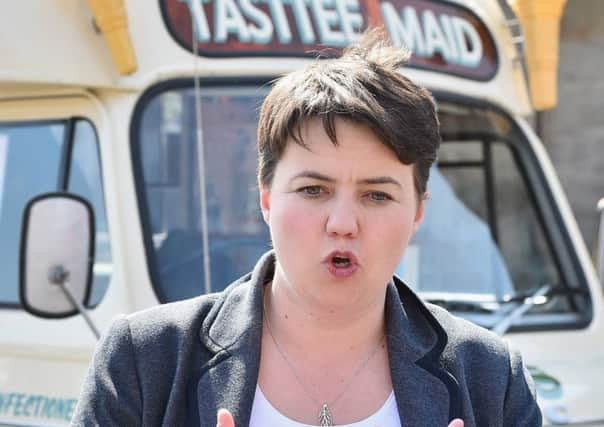Brian Monteith: Independent thinking can save the Union


What is left of the Christmas turkey is now being fashioned into a curry, folded with cranberry sauce into a wrap or frozen in time for some future repast that is as yet unknown. Surely a metaphor for the largest turkey in our political firmament, the Scottish Labour Party?
True, the Scottish Conservative party appears to be flatlining at 12 per cent, but then the Tories are in government at Westminster and, allegedly, the root of all evil. Scottish Labour has no such excuses. Its carcase continues to rot despite the best efforts of all involved to preserve it.
Advertisement
Hide AdAdvertisement
Hide AdSurely, if the received wisdom that Scotland is far more left-of-centre than the rest of the United Kingdom were true, a Labour Party that pitches itself as more left-of-centre than the Scottish National Party must at some point begin to gain support from those that have deserted it? Unfortunately the latest polling suggest that the trend is going the other way.
Despite sustained and quite credible attacks (in as much as they are supported by a substantial body of evidence) the number of those willing to vote Labour is declining to almost a third of those that would vote SNP (21 per cent against 58 per cent). What more then can the Labour Party do? It has changed its leaders as often a football team on the slide and with similarly results. Relegation to the status of a party with no directly-elected members of the Scottish Parliament is now a genuine prospect.
For years, if not decades, it was clear that one of the substantial difficulties of the Scottish Conservatives was that they were not perceived as especially Scottish; the other was that they were not particularly Conservative. With such a self-contradictory branding they were always likely to be at war with each other.
For what seems like a generation, many, including my humble self, argued that, once devolution was delivered against the party’s advice, the only way for it to rediscover its ancient Scottish roots and establish what it meant to be both patriotic and Conservative required that it separate itself administratively and politically from the UK party based (understandably) in London. Only then could it begin to gain acceptance that it was arguing for Scotland’s best interests within the UK from a conservative perspective. This approach has been steadfastly resisted by the Tory establishment, be it by the old buffers or the new metrosexuals. Shouting louder, even shouting with more pastel shades rather than the primary colours of the past appears to have made no difference.
Likewise, after taking a sustained drubbing in election after election, the argument has been put about that what Scottish Labour needs is to become more recognisably Scottish and Labour if it is to take on the SNP successfully. Given that the British Labour Party has always been more centralised than even the Conservatives, this approach resonated with progressive reformers.
Unfortunately for both parties, while changing the constitutional governance of either party might make rational sense to activists, it will make absolutely no difference to the voters. I can assure both Labour and Conservative supporters that there is no-one standing in a bar anywhere in Scotland saying: “I’m voting Labour because they really stand up for Scotland’s interests – against the interests of their own UK party.” The word Labour and Conservative are interchangeable in this respect.
The reason for this is that the Scottish leaderships of both parties will have to exercise independence with a force and regularity before it is generally accepted to be genuine. Only then will their pronouncements on education, health, housing and the potholes in Glebe Street be accorded any credence amongst voters open minded enough to consider voting on political merit.
It is the mixed messages of Labour and Conservative leaders between their devotion to the best interests of Scotland or their maternal parties that have ensured changes have gained little traction with the electorate.
Advertisement
Hide AdAdvertisement
Hide AdRuth Davidson is undoubtedly an able debater who, in being open and honest about her sexuality, has won many admirers for her political courage. This has imbued her commitment to tax cuts specific only to Holyrood with a similar honest credibility. She could go further and find many other areas where she would do things differently from Downing Street that would build her credentials as the true opposition leader to Nicola Sturgeon. It is a matter of regret that she has, for instance, chosen to be more europhile than Cameron or Osborne.
By contrast Kezia Dugdale has yet to present herself in as credible a manner by discovering her own honest approach to Labour’s politics. She has not been helped by the election of Jeremy Corbyn who is most likely to be to the left of her policies. Attacking independent schools and soaking Scotland’s richest through higher taxes may make for good headlines but only serves to depict the SNP as the sensible wing of social democracy.
While attacking an SNP record that would undoubtedly have been dubbed scandalous if it were delivered by any other administration is necessary, it can only hit home if those making it appear competent themselves. Having policies that suggest swivel-eyed socialism simply strengthens the SNP’s unearned and undeserved reputation for good governance.
Showing the courage to challenge their own UK leaders in the name of better outcomes for the Scottish people is, paradoxically, the only way to win elections and preserve the Union. Anything else will result in more Turkeys voting for next year’s Christmas, no matter how it is served up.